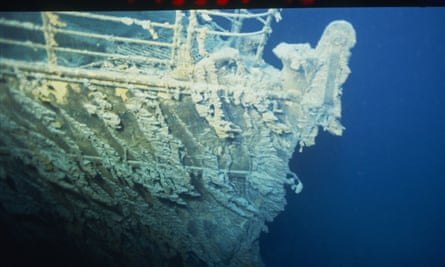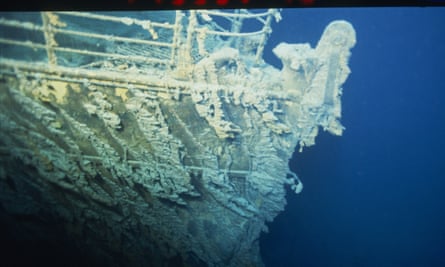US and Canadian rescue teams are scrambling to search for a tourist submarine that went missing during a voyage to the Titanic shipwreck with a British billionaire among the five people onboard.
Hamish Harding is the chair of the private plane firm Action Aviation, which said he was one of the mission specialists on the OceanGate Expeditions vessel reported overdue on Sunday evening about 435 miles south of St John’s, Newfoundland.
The vessel, known as Titan, is understood to have a four-day supply of oxygen onboard, which would have started being used on Sunday morning.
The Pakistani businessman Shahzada Dawood and his son Sulaiman Dawood have been named as two of the other people on the submersible.
A statement from the Dawood family, obtained by CNN, said: “As of now, contact has been lost with their submersible craft and there is limited information available.
“We are very grateful for the concern being shown by our colleagues and friends and would like to request everyone to pray for their safety while granting the family privacy at this time. The family is well looked after and are praying to Allah for the safe return of their family members.”
The other two passengers are believed to be Paul Henry Nargeolet, a former French navy commander, deep diver and a submersible pilot, and Stockton Rush, the chief executive and founder of OceanGate Expeditions, the company that organised the mission to the wreck of the Titanic.
The Titanic sits 3,800 metres (12,500ft) beneath the surface at the bottom of the Atlantic. It is about 370 miles (600km) off the coast of Newfoundland.
A massive search and rescue operation led by the US Coast Guard and involving military aircraft 900 miles east of Cape Cod was continuing on Tuesday.
The US Coast Guard said the Canadian research vessel Polar Prince and 106 Rescue Wing would continue to conduct surface searches while the US Coast Guard sent two C-130 flights to look for the missing submersible.
Rear Admiral John W Mauger of the US Coast Guard said they were doing “everything” they could to find the submersible, saying it had one pilot and four mission specialists onboard with up to 96 hours of emergency oxygen.

Titan’s support vessel, the Canadian research icebreaker Polar Prince, would continue to do surface searches throughout the evening and Canadian P8 Poseidon aircraft would resume their search on Tuesday, the Coast Guard said.
Harding holds three Guinness World Records, including the longest duration at full ocean depth by a crewed vessel when in March 2021, he and the ocean explorer Victor Vescovo dived to the lowest depth of the Mariana Trench. In June 2022, he went into space on Blue Origin’s New Shepard rocket.
On social media at the weekend, he said he was “proud to finally announce” he would be onboard the mission to the wreck of the Titanic, the luxury ocean liner that hit an iceberg and sank in 1912, killing more than 1,500 people.
The Explorers Club, of which Harding is a founding member, revealed his disappearance on Instagram. The club president, Richard Garriott, said: “When I saw Hamish last week … his excitement about this expedition was palpable.
“I know he was looking forward to conducting research at the site. We all join in the fervent hope that the submersible is located as quickly as possible and the crew is safe.”

Officials are working to get a remotely operated vehicle (ROV) that could reach a depth of 6,000 metres to the site.
ROVs can be dropped over the side of a vessel, to which it is connected by a “umbilical cord” that enables a pilot to operate its thrusters and also relay data in real time from its sonar and camera systems. However, the amount of wreckage from the Titanic on the ocean floor means it could take time to discern what is debris and what is the Titan.
Experts have said that even if the vessel is found, retrieving it could also prove difficult, especially if it has become entangled in the century-old wreckage.
“There are parts of it [the Titanic] all over the place. It’s dangerous,” said Frank Owen, a retired Royal Australian Navy official and submarine escape and rescue project director.
Alistair Greig, a professor of marine engineering at University College London, said: “If it has gone down to the seabed and can’t get back up under its own power, options are very limited.
“While the submersible might still be intact, if it is beyond the continental shelf, there are very few vessels that can get that deep, and certainly not divers.”
Join the exciting world of cryptocurrency trading with ByBit! As a new trader, you can benefit from a $10 bonus and up to $1,000 in rewards when you register using our referral link. With ByBit’s user-friendly platform and advanced trading tools, you can take advantage of cryptocurrency volatility and potentially make significant profits. Don’t miss this opportunity – sign up now and start trading!








Recent Comments